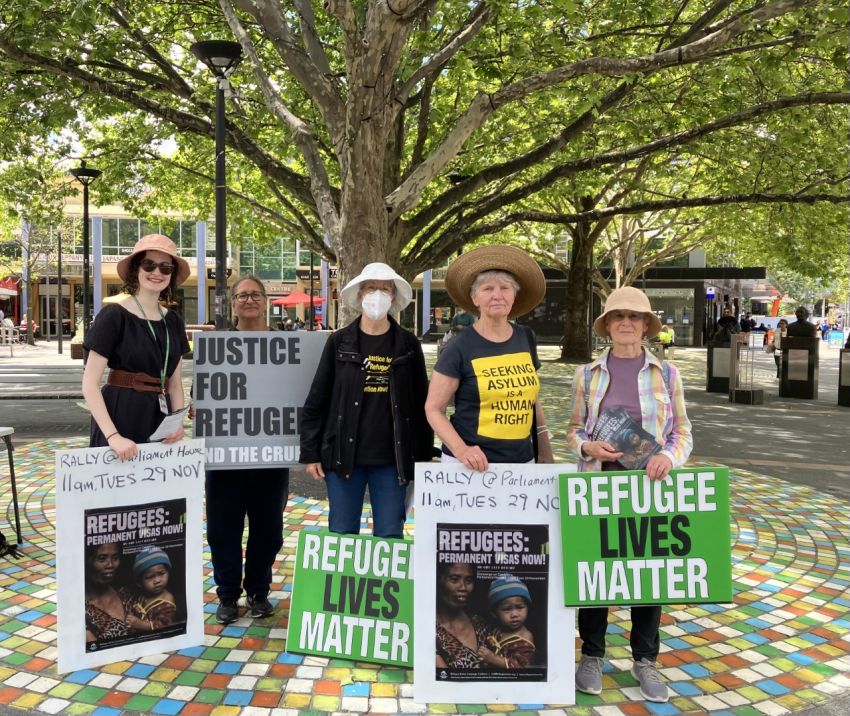
Refugees and their supporters have called a rally in Canberra on March 6, when Parliament resumes. They are also planning major rallies around the country on April 2, the week before Easter.
These protests have been called, in part, as a response to Labor’s announcement, on February 13, that about 19,000 refugees on two types of temporary visas will be able to apply for, or be transferred onto, applications for a “resolution of status” permanent visa.
This resolution has been a long time coming: these people are among those who form the decade-old “legacy caseload” of the Australian government’s detention and rejection of people who came to Australia to seek asylum.
However, Canberra has made this resolution less than certain by requiring them to make a new application, rather than simply transferring people to the new visa.
It has also said the application assessments may take up to a year to complete. However, as immigration administration is in chaos, a refugee’s wait could be much longer.
Despite these difficulties, many refugees are celebrating that they can finally make resettling plans, including reuniting with family members, and finding better work, study and financial opportunities.
Yet, many are also ambivalent and protesting. As they point out, their communities, and sometimes even their families, are being divided between those who can now settle here and those who cannot. For instance, one brother could get a permanent visa, another cannot.
Refugee musician and artist Farhad Bandesh, commenting on Twitter, said this is “great news now after more than a decade, 19 thousands refugee are allowed to apply for permanent residency in Au … What about 11 thousands should remain in limbo again? No news for the rest of pple who are still suffering in off-shore prison camps?”
He is correct. The future of those 11,000 other refugees and people seeking asylum in Australia remains uncertain.
‘Fast Track’ process unfair
About 5000 refugees are still pursuing their visa applications and aim to convert to the new, permanent, visas. But the visa decisions are not known yet and the Coalition government’s “Fast Track” process was unfair.
Indeed, 2000 people who have gone through Fast Track did not get temporary visas. Their cases remain at various stages of the appeal process in the courts, including having unsuccessfully appealed, or currently appealing visa rejections through the Administrative Appeals Tribunal (AAT).
The AAT has become so discredited, however, from the Coalition government’s appointment of former MPs and staffers, that federal Labor is abolishing it.
A third group, which includes Hazaras and Tamils, had their refugee cases so badly done that they were refused both refugee status and a bridging visa. This means they were denied the right to work and education, as well as Medicare and any other government help, including housing. They are surviving only with help from others, in particular the Brigidine Asylum Seeker Project.
About 2500 people, who had one of the two temporary visas, have had their visas cancelled because they have a criminal offence. Very often, however, these are not serious crimes: for example, traffic offences (hardly justification for the claims of bad character).
More than 1000 of these refugees are among those who were imprisoned earlier in offshore camps on Nauru and in Papua New Guinea. Still, about 150 refugees are stuck on Nauru and Port Moresby. They have all been told they can never settle in Australia, with nearly half having, as yet, no prospect of settling anywhere.
Movement needs to continue
Much can be learnt from the refugee movement, including sections of it wrongly thinking the Kevin Rudd-Julia Gillard-Rudd Labor government, a decade ago, had resolved the issue.
Then came the months of uncertainty, waiting to see if the new Prime Minister Anthony Albanese would fulfil his election promise to give permanent protection to temporary visa holders.
The week after the resolution of status announcement, Labor sent the navy to turn back a non-existent refugee armada in Australia’s north, amid racist humbug and scare-mongering.
Labor has been a key proponent of the White Australia policy across its different epochs. Former Manus Island Kurdish-Iranian detainee and author Behrouz Boochani has rightly argued that the detention of refugees is one modern form of White Australia.
Labor has ramped up Operation Sovereign Borders, including getting Border Force to publish new videos warning asylum seekers that the new visa announcement would not improve their chances of coming to Australia.
A good number of refugee supporters think it best to support Labor’s new visa announcement and restart campaigning (such as trying to sway votes for new measures) at its next national conference.
Others respond that the movement for refugee rights needs to continue. While Labor’s announcement is welcome and a testament to the ongoing efforts of refugee rights campaigners, Labor has not abandoned its inhumane boat turn-back and mandatory detention policies.
The movement to dismantle this racist and illegal system — in which individual asylum seekers and families are its mercy — has to continue.
We need to ensure safety for: refugees who are stuck in Australia without a permanent place to stay; for refugees still held in offshore prisons; for refugees stuck in Indonesia; and for refugees unable to get out of Afghanistan.
Until all of that is resolved and the story about refugees is different in this country, there is no reason to stop marching.
[Jonathan Strauss is a member of Socialist Alliance and the National President of Rural Australians for Refugees.]